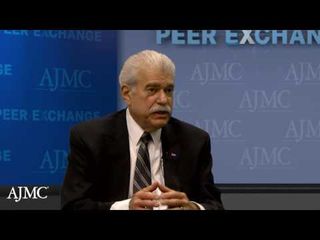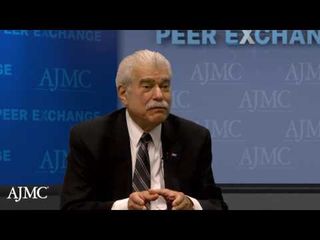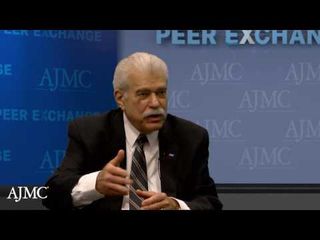
Value-Based Care
Latest News
Latest Videos

CME Content
More News

The benefits and challenges of joining CMS' Virtual Group option for healthcare providers to report their Quality Payment Program (QPP) measures from 2018.

Shifting care for patients with chronic obstructive pulmonary disease (COPD) from the hospital to the home reduced hospital readmissions by 64% and emergency department visits by 52%, a Canadian program found.

Over the next years, these spheres (ACOs, primary care, and oncology) that are going on in CMMI need to be coalesced together so that when we have learning collaboratives, not only do we have learning collaboratives within each of these spheres, but we learn from each other in these similar projects, said Peter Aran, MD, medical director of Population Health Management at Blue Cross Blue Shield of Oklahoma.

Earlier this month, CMS announced that 561 accountable care organizations will be participating in the Medicare Shared Savings Program in 2018, with 10.5 million assigned beneficiaries.

Given that 2018 marks the last year of the transition-year policies, implementation challenges identified during the first 2 years of Medicare Access and CHIP Reauthorization Act (MACRA) preparation and execution must be addressed to ensure effective delivery of high-value care as intended.

A study evaluating the association between hospital sharing of electronic health record diagnostic information and hospital quality using Hospital Compare scores.

Hospital participation in Meaningful Use was associated with reduced disparities in 30-day readmissions for African American Medicare beneficiaries.

It’s very unusual to see significant cost savings in the first year of a program; that was true of all the pioneer ACO programs, said Jeff Patton, MD, CEO of Tennessee Oncology.

Both accountable care organizations (ACOs) and narrow networks are important components of the value-based care movement. However, while there are features common to both models, Catalyst for Payment Reform has learned that what constitutes ACOs and narrow networks is inconsistent across health plans.

A recent study, published in JAMA Dermatology, investigated whether there was an association between insurance type and surgical delays for patients with melanoma.

With reimbursement increasingly tied to outcomes, health systems and practices are trying to find ways to reduce costs while delivering better care. Some of the most-read articles in The American Journal of Managed Care® (AJMC®) in 2017 included an analysis of the benefits of treating everyone with hepatitis C with new, expensive treatments, a program to reduce readmissions, and a look at the impact of value-based contracting in Medicare Advantage.

Contributors to AJMC.com delved into data to share their knowledge about important topics in managed care, and in 2017, these were the top 5 most-read articles they wrote and published on our online managed care network.

Coverage from the Community Oncology Alliance (COA)’s Payer Exchange Summit on Oncology Payment Reform, held October 23-24 in Tysons Corner, Virginia.

Implementation of the Quality Blue Primary Care program in Louisiana was associated with a shift in primary care delivery and reductions in overall cost.

The conclusion drawn by panelists participating at the National Comprehensive Cancer Network’s Oncology Policy Summit on Redefining Quality Measurement in Oncology was that ensuring access to appropriate data and using that information to improve healthcare outcomes remains an ongoing challenge.

Speaking at the National Comprehensive Cancer Network Oncology Policy Summit on Redefining Quality Measurement in Oncology, Ronald Walters, MD, MBA, MHA, MS, associate vice president of medical operations and informatics at The University of Texas MD Anderson Cancer Center, emphasized the need to focus on the patient’s preferences and values in cancer care delivery.

The FDA has recognized the need to include the patient's voice in the drug development process. The question is: what is the best way to do this?

The participation of residents and physician assistants significantly increased patient wait time without reducing the attending surgeon’s consultation length in outpatient surgery clinics.

A growing number of clinicians specializing in nursing home care indicates the beginning of a new trend in healthcare, but the impact of these new specialists on outcomes remains unclear.

The review period in the report bridged a public scandal at the VA that forced the resignation of a former Cabinet secretary.

Catalyst for Payment Reform is leading a movement for employers and other healthcare purchasers to push for greater transparency into their health plans’ ACO arrangements.

In a Tuesday session at the American College of Rheumatology’s 2017 Annual Meeting in San Diego, California, Greg Mertz, MBA, FACMPE, managing director for Physician Strategies Group, LLC, presented a talk title “Value Contracting: Opportunities of Fantasy?” in which he outlined the current landscape for performance-based contracting.

Every week, The American Journal of Managed Care® recaps the top managed care news of the week, and you can now listen to it on our podcast, Managed Care Cast.

Following the transition year and ahead of the full implementation in year 3, CMS made provisions to the Quality Payment Program to make it easier for clinicians to participate in the program, reduce burden, and to get clincians ready for full implementation.

During the final panel at the fall meeting of the ACO & Emerging Healthcare Delivery Coalition® in Nashville, Tennessee, panelists discussed the progress specialties have made in moving to value-based payment models, as well as the challenges facing the industry as a whole. The panel consisted of 3 individuals who provided perspectives from specific specialties, and 1 with an overall policy perspective.















